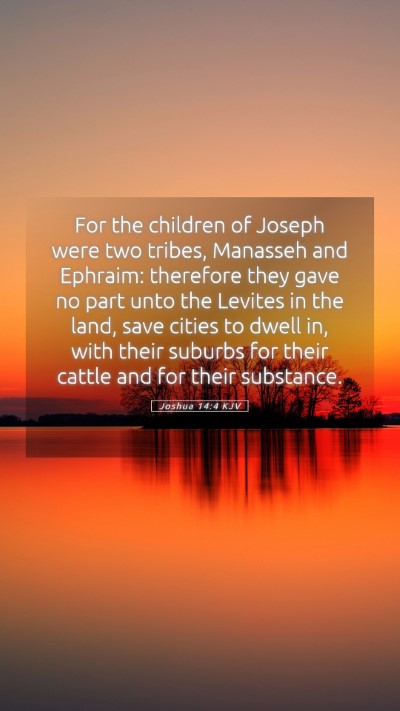Old Testament
Genesis Exodus Leviticus Numbers Deuteronomy Joshua Judges Ruth 1 Samuel 2 Samuel 1 Kings 2 Kings 1 Chronicles 2 Chronicles Ezra Nehemiah Esther Job Psalms Proverbs Ecclesiastes Song of Solomon Isaiah Jeremiah Lamentations Ezekiel Daniel Hosea Joel Amos Obadiah Jonah Micah Nahum Habakkuk Zephaniah Haggai Zechariah MalachiJoshua 14:4 Meaning
What is the meaning of Joshua 14:4?
For the children of Joseph were two tribes, Manasseh and Ephraim: therefore they gave no part unto the Levites in the land, save cities to dwell in, with their suburbs for their cattle and for their substance.
Joshua 14:4 Bible Verse Meaning
Bible Verse Meaning & Commentary: Joshua 14:4
Joshua 14:4 (KJV): "For the children of Joseph were two tribes, Manasseh and Ephraim: therefore they gave no part unto the Levites in the land, save cities to dwell in, with their suburbs for their cattle and for their substance."
Overview
Joshua 14:4 provides insight into the distribution of land among the tribes of Israel, particularly noting the unique situation of the Levites. This verse contributes to our understanding of biblical inheritance and the specific roles assigned to different tribes, setting the stage for the practices and responsibilities established in the Old Testament.
Bible Verse Explanations
- Meaning of the Verse: This verse indicates that the tribe of Levi did not receive a distinct geographical portion in the same manner as the other tribes because their role was to serve in the religious duties of the Tabernacle.
- Tribal Roles: The children of Joseph, specifically Ephraim and Manasseh, are distinctly noted here, which reveals their prominence and the division of the inheritance among Jacob's descendants.
- Levites' Exemption: The Levites are highlighted as they were set apart for spiritual duties, suggesting that their inheritance was spiritual rather than material.
- Contextual Background: Understanding the historical and cultural context allows for a deeper comprehension of the Levites' special role and the significance of land allotments during the conquest of Canaan.
Insights from Public Domain Commentaries
Matthew Henry’s Commentary
According to Matthew Henry, this verse underscores the significant role of the Levites in Israel’s religious life. He discusses how the land assignments were purposeful and reflects God’s plan for sustaining the priesthood, as the abundance of their needs would come through cities of refuge and pastoral lands provided by the other tribes.
Albert Barnes’ Notes on the Bible
Albert Barnes expounds on the practical implications of the Levite's situation, pointing to the necessity of their dependence on the other tribes. The verse highlights not only their spiritual responsibilities but also showcases God's provision for His servants through the generosity of the other tribes.
Adam Clarke’s Commentary
In Adam Clarke’s view, this verse illustrates the accountability of the Israelites in maintaining the Levitical order by providing for the Levites’ needs. It signifies a commitment to supporting those who are dedicated to God's service, thereby fostering unity and cooperation among the tribes.
Key Themes in Joshua 14:4
- Divine Organization: The land distribution signifies God's organized plan for His people.
- Levites’ Role: An understanding of the Levites' unique spiritual and social responsibilities.
- Historical Allocation: Insight into how inheritances were managed among the tribes points to a communal approach to land ownership and priestly support.
- Covenantal Relationships: Emphasizes the interconnectedness of the tribes of Israel and their commitments to one another in fulfilling God’s design.
Cross References
- Numbers 18:20-24 - Explains the Levitical inheritance further.
- Joshua 13:14 - Discusses the giving of cities to the Levites.
- Deuteronomy 10:9 - Highlights the Levites’ exclusion from land inheritance in Israel.
Conclusion
Understanding the meaning of Bible verses like Joshua 14:4 provides profound insights into the spiritual and communal aspects of ancient Israelite society. By studying the commentary from public domain sources, we gain a deeper appreciation for the dynamics of tribal relationships, the sacredness of the Levites' calling, and the historical context of land allocation. This verse, therefore, is not only a record of geographical distribution but also a significant reminder of collective responsibility in spiritual service and community.
Bible Study Tools
For those seeking to delve deeper into this and similar Bible passages, consider utilizing Bible study tools, online Bible study resources, and group discussions focusing on Bible study lessons related to Old Testament themes. Engaging in bible study groups or following a structured bible study plan can enhance understanding and application of Scripture.


